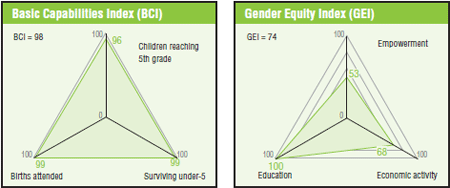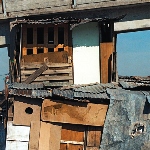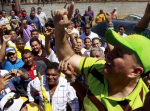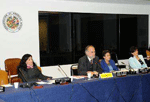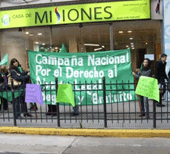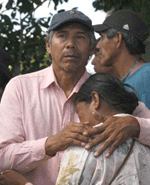Argentina
Can Argentina Meet the 2030 Agenda SDGs?
The approval of the 2030 Agenda for Sustainable Development coincided with the election of President Mauricio Macri’s new Government in Argentina. The first six months of President Macri’s administration reveal a strong shift in policy that will have a significant impact. In this context, the evidence shows that under the current policies, not only will the Sustainable Development Goals (SDGs) agreed upon in the 2030 Agenda not be met, there will also be a significant reversal in terms of the social and environmental achievements of the previous decade. Preserving the social progress and well-being attained to date and coordinating critical actions is essential in light of a new neoliberal turn that seems to set the stage for greater social inequality and environmental contamination. The country’s array of active forums for involvement (unions, community and civil society organizations) must therefore review their positions and establish common goals in line with the SDGs.
Published on Tue, 2019-04-02 08:46
In Argentina over 10 percent of households are not connected to a clean water supply network and over 30 percent lack sanitation. Investment in water and sanitation was stable at around 2 percent of public expenditure between 2012 and 2015. It dropped to 1.4 percent in 2016 and 0.3 percent in 2017, months before President Mauricio Macri announced in May 2018 the request for an IMF emergency loan that may result in fiscal austerity with further cuts to budgets. |
Published on Fri, 2017-10-27 13:26
Since 2015, with the election of a new government, Argentina has seen a radical change of policies, from a development model based on strengthening local markets, trade protectionism, expansion of social rights and an active role of the State in redistributing the income from agricultural exports, to a model inspired by neoliberalism, free trade, competitiveness in global markets and tax exemptions. According to the Argentinian Social Watch report, “this has led to a substantial redefinition of the role of the private sector in development policies”, of which the privatization of State-owned land is a striking example. Since 2015, the government has authorized the sale to private investors of 93 State-owned extensions, half of them in the city of Buenos Aires, where one-tenth of the population lives in overcrowded conditions and some 200,000 people live in slums. |
Published on Thu, 2017-08-03 09:29
The measures adopted by the Venezuelan government, in the context of the election of the Constituent Assembly and protests by those who question it, further aggravated the human rights situation in that country. On July 30, the government again responded with violence to demonstrations against it. On this occasion, ten people died, raising the number of people killed in protest situations to 119 in the last four months. According to investigations by the Public Prosecutor’s Office, a considerable percentage of these deaths resulted from shots fired by police and military officials. Other deaths are due to the actions of armed civilian groups that respond both to sectors of the opposition that propose an insurrectionary response and to para-state groups. In situations of protest, the state response must be based on the principle of protecting life; this emanates from states’ international human rights obligations. |
Published on Thu, 2017-01-26 16:27
In various remarks in the last few days, Argentine government officials have insisted upon blaming foreign-born people for drug trafficking in our country. Security Minister Patricia Bullrich used skewed and decontextualized statistics and stigmatizing assertions to try to justify a toughening of the nation’s immigration policy, which the government has been announcing for several weeks. |
Published on Fri, 2016-09-23 22:33
The adoption of the 2030 Agenda by the UN coincided with a change of government in Argentina, which is reversing the public policies that were put in place to deal with the serious social, economic, institutional and political crisis of 2001 and 2002. In its first months in power, the political coalition Cambiemos (Spanish for Let’s change) shifted away from a development model based on strengthening the domestic market, trade protectionism, expansion of social rights and an active role of the state in income redistribution through the collection of taxes on exports of agricultural products, towards a model favouring free trade, a competitive position in the global market, a lower level of state intervention in the overall economy and a reduction in taxes for the rich. Instead of continuing to expand social protection as required by the SDGs, the current government is aligning public policies with the interests of the sectors with greater political and economic power. The violation of various economic and social rights, which has occurred in a very short time, is creating a gradual and growing rejection within different social sectors. |
Published on Tue, 2016-01-19 12:45
Owners, executives and managers of some prominent companies actively participated in the human rights violations committed against workers during Argentina’s 1976-1983 dictatorship, according to the report “Business responsibility in crimes against humanity: The repression of workers during state terrorism.” (available in Spanish) The report, laying out evidence of such violations, was recently released by Argentine human rights organization the Center for Legal and Social Studies (CELS, according to its acronym in Spanish), the Area of Economy and Technology of the Latin American Faculty of Social Sciences (FLACSO-Argentina), and the Truth and Justice Program and Human Rights Secretariat – both of which belong to the Argentine Ministry of Justice and Human Rights. |
Published on Sat, 2015-09-12 07:22
The Basic Principles on Sovereign Debt Restructuring Processes, promoted by members of the Group of 77 developing countries and China, reflect demands regarding the need to establish fairer and more equitable debt restructuring mechanisms that social organizations have been making since the 1990s. Principle number 8 recognizes that restructurings must respect human rights and contribute to “sustained and inclusive” economic growth in debtor countries to minimize the economic and social costs of financial crises. This mirrors some of the points that a group of 100 social organizations underscored last year regarding the capacity of States to strike accords with a majority of their creditors that guarantee the economic, social and cultural rights of their populations. We also contended at that time that the resolution of debt-related conflicts between a State and its creditors should be based on Public International Law and International Human Rights Law. |
Published on Thu, 2015-05-28 10:50
Revised global standards on the treatment of prisoners were adopted in Vienna to provide greater protection to persons deprived of their liberty. The detailed guidelines currently in effect were established by the United Nations 60 years ago. The four-year-long revision process took into account contributions by CELS and other national and international human rights organizations. The text adopted at the UN Commission on Crime Prevention and Criminal Justice will be sent to the General Assembly for final approval. Starting in 2011, CELS and other organizations participated in the revision process during meetings of experts and the Commission's sessions. |
Published on Thu, 2014-09-04 20:11
This joint statement, signed by dozens of human rights organizations from all over the world, has been issued in response to the US Supreme Court decision on Argentina's sovereign debt. It has been coordinated by the Center for Legal and Social Studies (CELS) from Argentina. In a recent decision, the U.S. Supreme Court denied a petition filed by the Republic of Argentina in the case initiated by the vulture fund NML Capital. |
Published on Tue, 2011-11-01 08:08
The government of the Argentinean province of Formosa committed before the Inter-American Commission for Human Rights (IACHR) to search on a solution to the demands of Nam Qom indigenous community, that accuses the provincial police force of brutality. The community is represented by represented by Centre for Legal and Social Studies (Centro de Estudios Legales y Sociales, CELS), national focal point of Social Watch. After exhausting judicial remedies in the Argentinean judicial system, members of the Nam Qom Community in the Formosa province appealed to the IACHR seeking reparations for attacks committed by police forces in August 2002. |
Published on Tue, 2011-08-23 10:42
Sources:CELS, Misiones Online In Argentina, in the province of Misiones, 10 civil society organizations have accused the health system and the courts of failing to enforce the right to an abortion of a 14 year old girl who was raped. The child’s parents tried to obtain an abortion from the medical services and from the law courts, but they were met with delays and the case dragged on past the thirteenth week of pregnancy, and they have now withdrawn the petition they submitted to the courts. |
Published on Mon, 2011-08-01 08:05
Source: CELS. The Center for Legal and Social Studies (CELS), the focal point of Social Watch in Argentina, has been awarded the Gruber Foundation Prize for Justice. This annual award has been in existence for ten years; it is given to people and organizations in the human rights field in all parts of the world. |
Published on Mon, 2011-07-04 10:35
Source: CELS On June 25, members of the Toba-Qom indigenous community “La Primavera” of Formosa held an unprecedented event: the election of its representative before the national government and provincial authorities. The Centre for Legal and Social Studies (Centro de Estudios Legales y Sociales, CELS), focal point of Social Watch, participated as supervisor in this process, which resulted in the election of Félix Díaz. |
|
Published on Fri, 2011-06-17 09:40
Source The non-governmental Citizen Participation Forum for Justice and Human Rights (FOCO) accused the Canadian mining company Barrick Gold of violating in Argentina environmental and human health guidelines set by the Organization for Economic Co-operation and Development (OECD). |
|
Published on Fri, 2011-04-29 08:26
Source: CELS The Inter-American Commission on Human Rights (IACHR) decreed this month safety measures to guarantee the return of the members of the Toba indigenous community known as “La Primavera” to its land at the Argentinian province of Formosa. The action was promoted by the State Prosecutor’s Office of this Latin American country and the Centre for Legal and Social Studies (Centro de Estudios Legales y Sociales, CELS), national focal point of Social Watch. |
|
Source: Third World Institute (ITeM). Published on Wed, 2004-12-01 16:38
The evident and systematic violation of the right to health by the Argentinian Government, which is clearly shown in the collapse of the health system, was reported by several health institutions before the OAS Inter-American Commission of Human Rights. |

